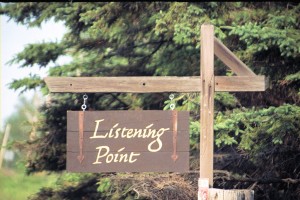Effective communication depends mainly on listening
A national panic ensued during the 1938 radio broadcast of The War of the Worlds. People didn’t listen to the many announcements made throughout the broadcast that the story was fictitious. Halfway through the program, Orson Welles looked up from his microphone to discover that the studio was filled with police. Radio stations, newspapers, hospitals, and police were flooded with phone calls regarding the “invasion”. People don’t listen any better today, to a great cost for them and everyone else involved.
 Listening is at the forefront of communication. Just think about how often during the day you spend time listening: the radio during your commute, television in the evening, at the movie theatre, through ear buds attached to a portable music player, audio seminars and podcasts over the Web, office conversations, airport announcements. The listening ability of airplane pilots and control tower personnel is critical to a successful and safe flight. And those company meetings you attend: one person talking, everyone else listening. The written word, and its incumbent paperwork, is much slower than the spoken word — when business needs to move fast, the keyboard and pen are eschewed in favor of oral communication: talking and listening.
Listening is at the forefront of communication. Just think about how often during the day you spend time listening: the radio during your commute, television in the evening, at the movie theatre, through ear buds attached to a portable music player, audio seminars and podcasts over the Web, office conversations, airport announcements. The listening ability of airplane pilots and control tower personnel is critical to a successful and safe flight. And those company meetings you attend: one person talking, everyone else listening. The written word, and its incumbent paperwork, is much slower than the spoken word — when business needs to move fast, the keyboard and pen are eschewed in favor of oral communication: talking and listening.
I had the good fortune to be in Washington’s Dulles airport on the fifth anniversary of September 11. Over the intercom came a booming voice: “Attention passengers and personnel. Your attention please.” We were reminded of the anniversary and were fed the live memorial ceremony from New York City. We were then asked to stand in a moment of silence. Virtually everyone and everything came to a standstill. It was a poignant and somber event, one that I will always remember. And it all took place because people stopped and listened.
Listening training? Companies spend virtual fortunes to ensure their staff can write, give presentations, speak in public, and plan and conduct meetings — all venues for disseminating information. But companies spend precious little time ensuring that these same people know how to listen, and yet the foundation of all effective communication is listening. Communication is a two-way street; we send out a message then wait for — and expect — a reply. Why? Because we want to be heard! And yet, do we actually listen to this reply other than to confirm that something was said? Probably not.
Few of us take the time to truly listen. Most people, when in a conversation or dialogue with others, are not really listening; they are simply being polite, half listening, and waiting for their turn to talk. Instead of listening while someone else talks, they formulate responses. This is not listening; it’s story telling.
Listening as a selling point. I was perusing the web site of a vertical market software company. They are rewriting the code for their main product offering, announcing it with these words: “We’ve been listening.” As if it’s such a surprising thing. But you know what? It is.
Listeners are exceptional people. Examples of listening abound, yet they are all so specialized. Harvey MacKay in his book Swim With the Sharks, recounts how his wife intently listened to a taxi driver on their 20-minute trip to the airport. When she paid the tab, the taxi driver said to her, “Lady, you are the nicest person I’ve ever met.”
Even in fiction, listeners are appreciated. M C Beaton, the Scottish mystery writer, in one of her books, speaking through her character Constable Hamish Macbeth, describes a witness as “that rarest kind of person, someone who truly listens”.
Of timeless importance. What does all this mean for you? Consider this. “The effectiveness of the spoken word hinges not so much on how people talk, but mostly on how they listen.” So says Ralph G Nichols and Leonard A Stevens (researchers from the University of Minnesota and the University of Iowa, respectively) in their Harvard Business Review (HBR) article, Listening to People. Through their research, Nichols and Leonard found that managers and office workers earn 40% of their salaries listening; executives earn up to 80%. They also found that the vast majority only half listen. Editorializes the HBR on their article, “They open up a subject of tremendous practical importance to executives.”
Successful sales professionals have long since discovered the value of listening. When in a selling situation, one of their highest priorities is to ‘qualify’ the customer. They must determine the needs of the customer to best match that customer with a product or service offering. During a sales presentation, there is only one way to ‘qualify’ a customer: by listening.
Your ability to listen effectively can be the difference between success and failure. Similar to the other forms of communication of writing and speaking, listening is a skill that can be learned. As professionals, as managers, as executives, listening is your highest duty.
–Rich Maggiani